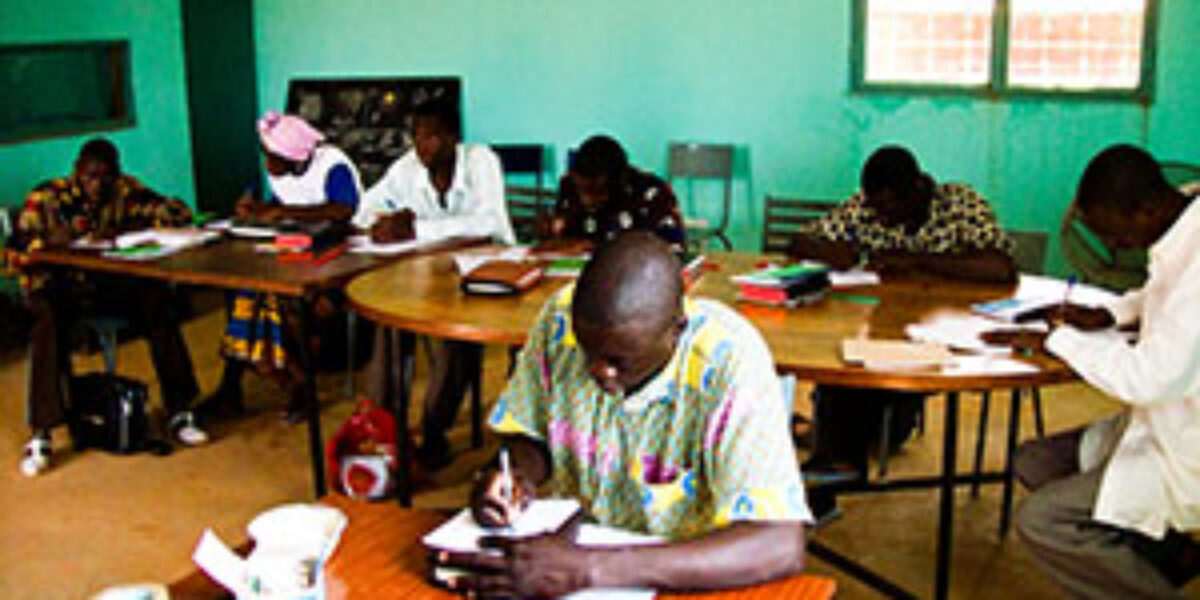ORODARA, Burkina Faso (Africa Inter-Mennonite Mission/Mennonite Mission Network) — During a lull in his Basic Biblical Training studies, Hamidou Traoré looked out through the window of the radio recording studio at the cement bricks outlining the future home of the Mennonite church’s Bible school in Orodara, Burkina Faso.
Traoré is one of seven young leaders preparing for ministry in Eglise Evangélique Mennonite du Burkina Faso. They took up their studies in January, the beginning of the dry season, when the agricultural work that feeds their families is not as demanding.
The vision of preparing Mennonite church leaders for ministry dates back more than a decade.
“For several years, we have given this task to sister denominations, who have trained our people in their Bible schools,” said Siaka Traoré, national president of the Mennonite Church of Burkina Faso and one of the teacher-mentors of Basic Biblical Training. “The time has come to begin a training program that will take into account our doctrinal convictions as Mennonites.”
Hamidou Traoré – not closely related to Siaka Traoré, their shared family name is one of the most common in Burkina Faso – and the six other leaders-in-training are being shaped for leadership in a way that draws on centuries-old educational methods. Four experienced pastors give of their time to teach and mentor the students in the Dioula language, which is the most widely used language in the region where the Mennonite church is strongest.
“In traditional societies, before the arrival of formal education, fathers faithfully transmitted their wisdom to their sons and mothers did the same for their daughters,” said Siaka Traoré.
He also pointed out that the Apostle Paul speaks of elders transferring their knowledge to younger people in the church and that Jesus taught by mentoring.
“The evangelical principle of making disciples is what motivates us in undertaking this program,” Siaka Traoré said. “With the goal of building a strong and growing church, we have found it imperative to give training to those whom God is calling to service.”
Traditional education methods do not require extensive infrastructure, permitting training to begin even before construction of the Bible school is completed. Three students began biblical studies in January 2008 in rooms belonging to the Mennonite radio recording studio, built in 2006 through the joint efforts of Mennonite youth from Burkina Faso and France working side-by-side.
This year participation more than doubled with seven future church leaders devoting the five dry season months from January to May to preparing for ministry.
About 13 percent of the training costs come from the students, their sending congregations and the national church. The rest of the funding comes from the Burkina Faso Partnership Council, the administrative structure through which North American Mennonite mission agencies work in the country. These agencies include Mennonite Mission Network, Africa Inter-Mennonite Mission, Evangelical Mennonite Conference based in Manitoba, and Mennonite Church Canada Witness as well as Mennonite Church of Burkina Faso and the mission committee of French Mennonites.
Hamidou Traoré’s father, Tiéba, was the first person to become a Christian as a result of Mennonite witness in Burkina Faso in the early 1980s when Africa Inter-Mennonite Mission linguists, Anne Garber (now Anne Garber Kompaoré) and Gail Wiebe, began to work in his village of Kotoura.
Kompaoré has continued to minister as a translation and linguistic consultant in Burkina Faso for the past three decades.
Tiéba Traoré’s determination in turning from African traditional religion and Islam to follow Jesus encouraged his son to do the same.
“I love God’s word and deepening my understanding of it,” said Hamidou Traoré, who leads worship and is a member of the leadership committee of the Kotoura Mennonite Church.







